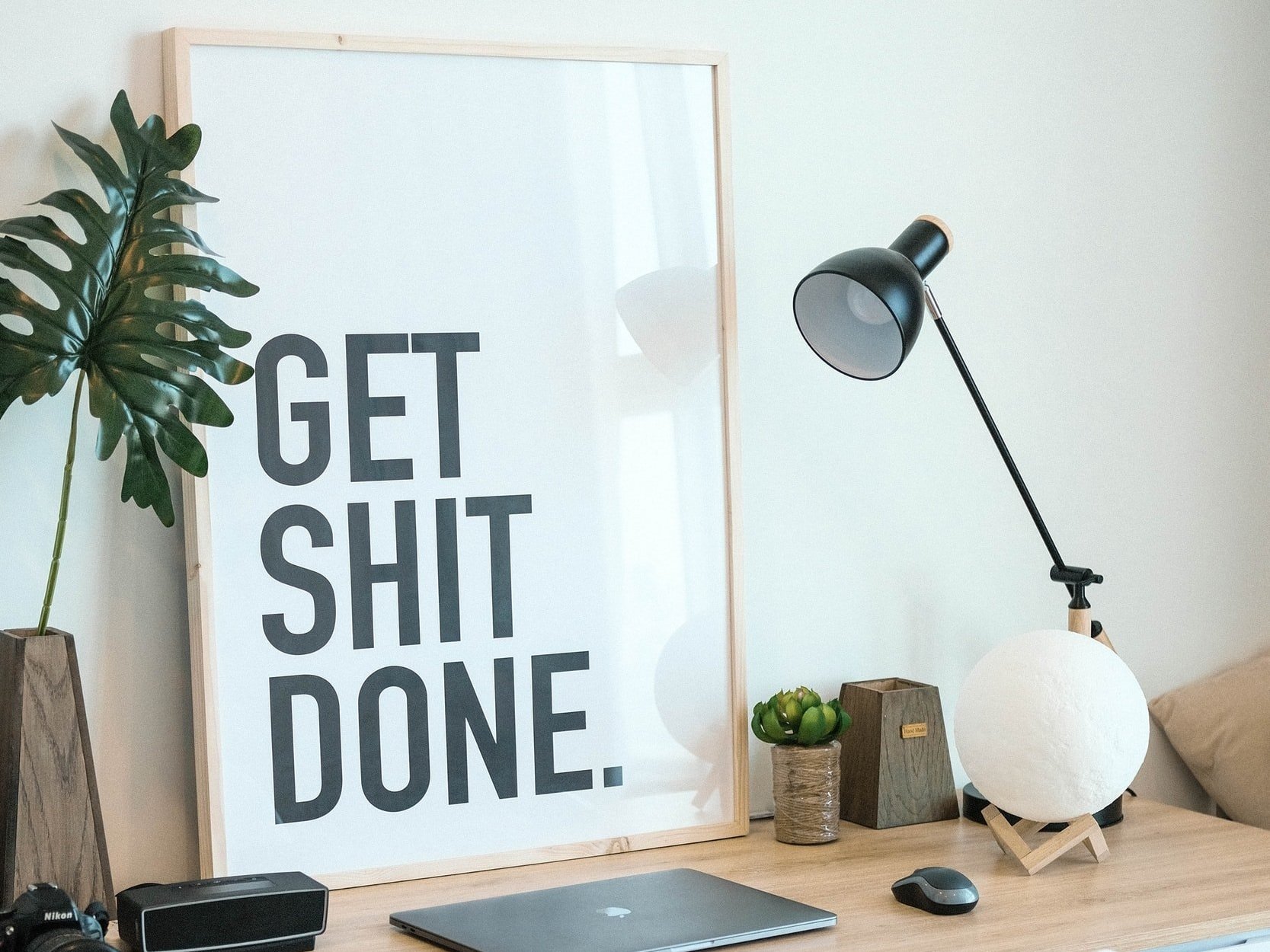7 Golden Rules for Increasing Your Productivity
A no-nonsense approach to GSD
When you have a demanding job or work for yourself, the sheer volume of tasks you need to do each day can soon take its toll. If, no matter how hard you work, you still feel work is ruling you, spare five minutes to learn my simple seven steps to increasing your productivity. If they can work for me, they can work for you too!
Overview: When work ruled my life
Rule 1: Learn how to be, not do
When work ruled my life (and I sucked at being productive)
In my earliest years as a senior manager, I found I was frequently pulled from meeting to meeting or had constant demands from the team asking for guidance or assistance. Yet I also needed to participate in organisation-wide management meetings, and complete business planning, reports and reviews in a timely manner.
On top of that, I was expected to keep up to date with the latest in management practice to continually improve my leadership and team performance. Away days with the management team were to be dreaded because when I returned, I knew the work would have backed up.
Things I wanted to do such as spend time with my team or interact and build strong relationships with colleagues took a back seat. Any time for planning and thinking was left to the weekend or evenings which had a negative impact on my family and relationship because I just wasn’t available for them. I couldn’t switch off.
Trying to juggle too much at once?
I had two lovely children – both with special needs – who not only wanted their mother to really be there for them but also needed me to be their biggest advocate. I managed to squeeze this in between all my other demands. This left me feeling guilty as I thought I just wasn’t doing enough. I often felt overwhelmed; as if I was running a marathon that had no finish line. My anxiety levels shot up and I was sure that any one of those balls that were in the air would come crashing down and it would all fall apart.
“I realised I was ‘doing’ senior management, not ‘being’ a senior manager. All the time I was ‘doing’ instead of ‘being’.”
I, thankfully, had the realisation that what needed to change wasn’t my work, but me! I started to learn about time management and tried a few productivity techniques. All of which were useful but difficult to keep up the practice. As soon as something happened I went back to my old habits of doing more. This didn’t really change the underlying problem. So I turned to personal development and read everything I could.
Then I took on my coach and mentor, who introduced me to the idea of ‘be, not do’ that things and things finally began to change. I realised I was ‘doing’ senior management, not ‘being’ a senior manager. All the time I was ‘doing’ instead of ‘being’, I would never be able to increase my productivity enough to be successful.
These are my seven golden rules for being more productive, starting with the most important one. Once I had learnt this, all the others fell into place.
Rule 1: Learn how to ‘be, not do’
Ignore distractions and focus on the task at hand
Simply put, being is about focusing to the exclusion of all other demands and expectations. Being is not difficult – what is difficult is to become good at it. It’s about being present. Whatever it is that you are doing now, focus on this with your thoughts and your mind.
Become aware of how you are sitting, what the air around you feels like and simply focus to the exclusion of all other concerns. Take a few moments to breathe deeply and put aside thoughts that have nothing to do with what is happening now.
Once you learn how to be, you’ll be better able to incorporate the next six simple productivity hacks into your work-life. So, go on, bookmark this article and practice the art of being! Come back when you’re ready to learn the next six steps.
Rule 2: Quit trying to multitask
Do yourself a favour and stop multitasking
Many of us are guilty of trying to do more than one task at a time. However, research has shown that although it might make you feel like you’re getting a lot done, in reality it can reduce productivity by as much as 40%.
Our brains are not good at handling multiple tasks, and it is far better to focus on one task, complete it, and then move on to the next. At the start of your working day, write down your top priority goal. Focus on this, and ignore distractions, until it is completed.
To help, try turning off notifications for other windows or apps you may be using, including email. It is tempting to check for new alerts, and research has shown that we cannot go six minutes without checking emails or instant messages.
To avoid these distractions, set certain times for checking emails such as 11am and 4pm, to help keep on top of communications without constantly being taken away from the task in hand.
Rule 3: Timeboxing
Manage your time better by blocking out chunks for specific tasks
Timeboxing is a simple technique for giving structure to your day. At the beginning or the end of the day – whatever works better for you – pause and list out all those things that you are juggling. Identify the urgent, the important and the stuff that creates noise. Select the two most important and schedule times (2-3 hours) in the day to focus on getting these done. Set aside three times of around 30 mins that you can allocate to those urgent tasks…
And as for the stuff that creates noise, either give them to someone else to do or just leave them to one side. Oftentimes, these things disappear because they just aren’t that important. They will definitely reappear if they are.
Finally, at the other end of your work sprint, take some time to review that list. Tick off all that you have done and really congratulate yourself on what you have achieved – then screw up and throw that list away. You can make a new one for the next work sprint.
Often, we forget to praise ourselves for what we have done and instead only see the mountain of work ahead. Practising this technique over time will help you to focus and get results.
If you are really into timeboxing one of the things, I recommend reading is the Pomodoro Technique.
Rule 4: Use your calendar
This really goes hand in hand with time boxing. My philosophy is if it isn’t in the calendar, it isn’t real and it’s not happening. The beauty of a calendar is that once it’s in there, you don’t need to clutter up your brain trying to remember it.
Declutter your brain
I include relaxation (me) time, family activities and relationship time. These help me keep my focus on life as well as work. I personally favour cloud-based calendars and Google calendar is my absolutely favourite because it syncs across all my devices.
And I am a geek – I love my devices! But if you’re into paper, then a paper diary works just as well.
Rule 5. Take Regular Breaks
This might seem counterintuitive to productivity, but to remain focused our brains need a break from work. Try working in cycles of short bursts and breaks, such as those recommended by the Pomodoro Technique, to increase productivity and reduce burnout.
During the break, walk around the office or your home, make a drink, or do some stretches. This means you can return refreshed to your work, improving productivity.
Avoid looking at your phone as your ‘break’, as this does not truly allow your brain to rest. If you find it hard to switch off, leadership coaching can help.
“Productivity plays a huge role in business success, and so it’s important to address any productivity hurdles to leave a clear path to better results. ”
Rule 6. Decide how to work
Set clear goals when working as a team
Although it seems that teamwork should be more productive, sometimes you can get far more done when working solely on a project. For this reason, think carefully before deciding to work as a team.
When group work is required, be sure to set clear individual and shared goals to ensure everyone pulls their weight and the overarching goal is achieved. Communication is important, but should not be excessive.
Only schedule meetings when necessary and keep emails to a minimum to allow everyone to focus.
Rule 7. Stop!
Knowing when to stop is key. Burnout is all too common amongst professionals, but it can be avoided. Start taking note of your limits, and don’t be afraid to push back and decline work that you cannot reasonably be expected to complete.
There is often room for negotiation which may include sharing the load or offering a later deadline. Similarly, make every effort to switch off from work outside of work hours.
Whatever your shift pattern, try to set strict boundaries to protect your mental health and ensure optimum productivity the next time you sit down to work.
Work smarter, not harder
These are some top tips I offer as part of leadership coaching, guaranteed to help you be more productive. Leadership coaching offers you a chance to objectively look at your goals and ways that you can move forward professionally. Productivity plays a huge role in business success, and so it’s important to address any productivity hurdles to leave a clear path to better results.
For your free 30-minute coaching consultation, contact me today.
Need a productivity mentor?
Book your free coaching chat to see how I can help you find your ideal work-life balance.
















